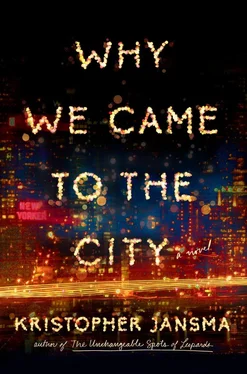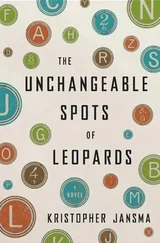Just then he saw a hint of color on the edge in the back of the book. Carefully he turned to find a beautiful scene on the back leaf done in watercolors. Grays. Purples. Yellows. Blues. A busy street. Cars moving around a traffic circle while tall buildings gleam in the sunlight. White towers rising up into the blue heaven of a new day. The red neon on a Chinatown restaurant, still lit in the daytime. Sunlight gleaming off a water tower. The hushed, holy green that crept into the brown skeletons of city trees. Asphalt meridians curving through. Far away, the line of towers forming a horizon at the river. And rising up behind it all — the Brooklyn Bridge. No doubt it was hers. Her colors, her lines, her trembling wavelength. It was titled only “View from 4R,” but there on the opposite page was a note, in her handwriting.
William — Thank you for the book. I hope Sara gets it back to you! And I hope you don’t mind I did a picture on the other page, back when we were broken up and I thought I’d probably never see you again. I should explain, I guess, since you’ll want it back now. That’s the view from my bedroom at my grandmother Fiona’s apartment, 12 Spruce Street, where I went away to live when I was a girl and, let’s just say, not the most darling granddaughter ever. I loved it there, but then she got sick and passed away. I took some money and ran off because I didn’t want to have to go back home again. Once I told you how I was born into the wrong family. For a long time I looked for my right one, and now I know I found it. Sorry I stole your mother’s kimono. We should have been friends a long time ago, William. I would have liked that. Since we met, I’ve been wondering if this is fate, you know? Not in a cheesy way, but what if, no matter what I did all these years, I’d still be dying, just somewhere else? But then I think that maybe the where is what’s important. If the gods bother, then man must have free will. Je suis toujours sur le point de te quitter. All my love, Irene.
William sat there a long time. So she was from — well, just where he was from. He studied the picture again. Irene’s childhood kingdom. Like him, she’d stared out at this at night and fallen asleep in the same womb of street noises. Who knew? Maybe they had passed each other on field trips, or crawled under the same turnstiles. Surely they’d both gotten up early on snow days to watch NY1 to check for school closings, and on the Fourth of July they’d both watched the same fireworks in the same sky. They had skinned their knees on the same sidewalks and answered the same essay questions on the same Regents Exam. And when everyone else had left home to come here, they had been leaving there to come home.
8
After a while William left and started walking toward the closest train that would take him home. He called his mother on the way, but she didn’t pick up, and then he remembered she would still be with Chongso’s mother, wearing red mudang robes in their living room, with all the shades down and curtains drawn, while the assembled members of the Kim family sat on the couches and watched her do a dance that their grandparents’ grandparents had done. There would be howling and shouting and crying. The ghostly ancestors, lacking the proper equipment for speech, would be invited to borrow her vocal cords and tongue and lips. And the Kims would gradually allow themselves to believe what they needed to believe. That Chongso was fine. Locatable. Watching over them in the company of a hundred generations of Kims. William wanted to believe in this too; he was so tired of pretending that he didn’t.
He picked up his phone and, through its cracked screen, sent a text message to Sung-Lee, the girl he had gone out with twice while he and Irene had been broken up.
Did you hear about Chongso?
I kno! So sad! How r u?
I’m good. How are you?
Really good. Drink sometime?
His thumb hovered over the screen. Staring down at the penumbra of green light, he felt an odd sensation running up his arm. He moved his thumb gently to the keyboard and replied.
Now?
They met near South Street Seaport, where she knew a place that had good drinks and wasn’t too noisy. William soon found himself walking down Fulton Street, staring up at the Brooklyn Bridge again, which from this side seemed almost made of light. He felt the shadow of something close behind him. He passed dark window displays full of faceless mannequins. A saxophone cried out from the footsteps of the church. Everyone, everywhere was drunk.
William moved through crowd after crowd, seeking her silhouette. As he crossed under the FDR Drive, he heard Sung-Lee calling his name from the opposite corner. It took him a moment to spot her: in a navy blue coat with white trim, stepping out of a cab. She expertly navigated the cobblestones in stiletto ankle boots. She kissed him lightly on the cheek when he got close.
“I almost didn’t recognize you,” she said. “ Love what you’re wearing.”
“You do?”
William knew he was blushing. Sung-Lee looked far more beautiful than he’d remembered, at least in the soft light of the street. She wore a glittering necklace of silver sharks’ teeth. Her eyes were shadowed by a soft green.
“I hear your mother’s looking for you.”
William tried to explain. “Oh. Well. I was just—”
“Bad boy,” she teased. “Call your mother.”
Did she wink at him? Yes. He tried to laugh, as if it had been a joke, but something in her tone seemed off. She’d been so shy the last time they’d gone out. She’d worn flats. She hadn’t kissed his cheek unprompted or said anything along the lines of “bad boy.” He wondered if she was already drunk. The last time they’d gotten together, she’d had half a glass of wine and almost fallen asleep. Nothing like this.
“So they’re searching, like, the whole tristate area to find the guy who hit Chongso. Once they do, I hope they run him over.” Then she rolled her shoulders. “Anyways, how’s life?”
“Life’s… life,” he said. “How’s yours?”
“ Really great,” she said. “I’m having a lot of fun.”
“Fun. I think I had that once,” he joked.
She laughed. A lot. And grabbed his hand and said, “I’ll remind you. Come on.”
She led him down the street like a puppy dog to the Cutty Sark. A jaunty little ironwork clipper ship dangled from the sign at the entrance. Windows were festooned with ropes as thick as his wrists and aged canvas sails. A chandelier made from a ship’s wheel hung from a rusty block and tackle in the center of the room. At the many wooden tables along the decking sat men and women drinking beer and eating fish and chips. William and Sung-Lee took a seat at a table beside a man in a red wool cap, who was splitting a bowl of chowder with a man with sideburns and a porkpie hat.
She flagged down a passing waitress and ordered two Manhattans, one with five brandied cherries. “They rinse the glass with absinthe,” she explained. “Really makes the flavors pop.”
“Yeah, but doesn’t it eat holes in your brain?” William asked.
“Buzzzzzzzzz,” she lifted a pointer finger to the side of William’s skull. Then she ran a hand over the lump on his head.
“So, what, did you get into a fight?”
William smiled. “Actually, yes.”
She seemed — surprised? No. Impressed. He kept looking around, as if someone might see him with her. Not like he was cheating, even if that was how it felt.
“I can’t be out too late,” she announced, withdrawing her hand. “I’ve got a six a.m. flight to Istanbul for a conference.”
Some very loud song thumped its beat on the speakers across the way. She was sort of singing along and shifting her hips. At the chorus she sang along, “‘O… oh… oh. Dreams weave the rose…’ Have you seen this music video? It’s so awful. But I love the song.” She shrugged as if this were one more of life’s unresolvable little mysteries.
Читать дальше












